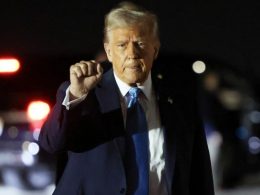This article is an on-site version of our FirstFT newsletter. Subscribers can sign up to our Asia, Europe/Africa or Americas edition to get the newsletter delivered every weekday morning. Explore all of our newsletters here
Good morning, happy Friday and welcome back to FirstFT Asia. In today’s newsletter:
-
US accuses Chinese firm of supporting Houthi attacks
-
Nvida’s Jensen Huang visits China
-
Jay Powell feels heat on interest rates
A Chinese satellite company linked to the country’s military is supplying Iran-backed Houthi rebels in Yemen with imagery to target US warships and international vessels in the Red Sea, according to American officials.
What the US said: The Trump administration has repeatedly warned Beijing that Chang Guang Satellite Technology Co Ltd, a commercial group with ties to the People’s Liberation Army, is providing the Houthis with the intelligence, according to the US officials. A senior state department official told the Financial Times that China had “ignored” the concerns. Tammy Bruce, the state department’s spokesperson, confirmed that CGSTL was “directly supporting Iran-backed Houthi terrorist attacks on US interests”.
Beijing’s role in the Middle East: China has expressed concern about the Houthis’ attacks in the Red Sea, a critical maritime route for global trade and the US navy. The Biden administration urged Beijing to use its leverage with Iran to rein in the Houthis — but officials saw no evidence that Beijing had done so. Asked about the US claims about CGSTL, the Chinese embassy in Washington said it was “not aware of the relevant situation”.
What is CGSTL?: The Chinese company was established in 2014 as a joint venture between the provincial government in Jilin and a branch of the Chinese Academy of Sciences in Changchun, the province’s capital. It has previously come under US scrutiny, and was among groups hit by sanctions in 2023 for allegedly providing high-resolution satellite imagery to Russia’s Wagner Group.
“Chang Guang is one of a handful of ‘ostensibly’ commercial Chinese satellite companies that are in fact deeply embedded in the military-civil fusion ecosystem, supplying global surveillance capabilities to both civilian and military customers,” said James Mulvenon, an expert on the Chinese military and intelligence services at Pamir Consulting.
Read more about CGSTL’s “close connections” to the Chinese government.
Here’s what else we’re keeping tabs on today and over the weekend:
-
Economic data: Japan reports March inflation data and Malaysia publishes first-quarter GDP.
-
US-Iran nuclear talks: US envoy Steve Witkoff is due to hold a second round of talks on Saturday with Iranian foreign minister Abbas Araghchi, days after calling for Tehran to “eliminate” its nuclear enrichment programme.
How well did you keep up with the news this week? Take our quiz.
Five more top stories
1. Nvidia chief executive Jensen Huang visited Beijing yesterday after new curbs from Washington on the chipmaker’s China sales sent its shares tumbling. According to people familiar with his travel schedule, Huang met the founder of Chinese AI start-up DeepSeek as well as Chinese vice-premier He Lifeng. Read more about the visit.
2. Trump has stepped up his attacks on Federal Reserve chair Jay Powell, accusing him of failing to cut interest rates quickly enough and claiming he would have the right to sack the US’s top central banker. Earlier yesterday Trump said on his Truth Social platform that “Powell’s termination cannot come fast enough!” Read the full story.
3. Japan’s chief trade negotiator will leave Washington without an immediate agreement after meeting Trump as part of efforts to negotiate the removal of stiff US tariffs. Japanese officials said the unanticipated personal meeting with the US president was a possible sign of the president’s keenness to hammer out trade deals.
4. A US federal judge has ruled Google illegally acquired and maintained a monopoly in digital advertising. The court’s decision marked the latest antitrust defeat for the technology giant that could result in it being forced to divest parts of its business.
5. Chinese tea company Chagee surged on its Wall Street debut yesterday, defying concerns about weak investor demand for new US listings and the intensifying trade war between the world’s two largest economies. Shares in the Shanghai-based chain rose as much as 49 per cent on its first day of trading on Nasdaq. Read more about Chagee’s strong debut.
The Big Read
The dollar, which normally strengthens in times of financial and economic strife, instead nosedived after Trump unveiled his “reciprocal” tariffs this month. Coupled with the administration’s hostility towards historical allies, investors have been forced to confront the possibility that the currency’s dominance might fade — or even end.
We’re also reading . . .
Chart of the day
Chinese officials and businesses are seeking a rapprochement with the EU to compensate for the loss of the US market amid Donald Trump’s trade war. But a reset in EU-China ties would need to overcome deep differences over China’s huge trade surpluses, the barriers to accessing its own market and Beijing’s tacit support for Russia’s war in Ukraine.
Take a break from the news
It is easier to acknowledge the less good parts of yourself when you’re told they were pre-determined by the stars, writes Jemima Kelly. Follow the FT’s resident contrarian as she tries to make sense of astrology.

Source link










